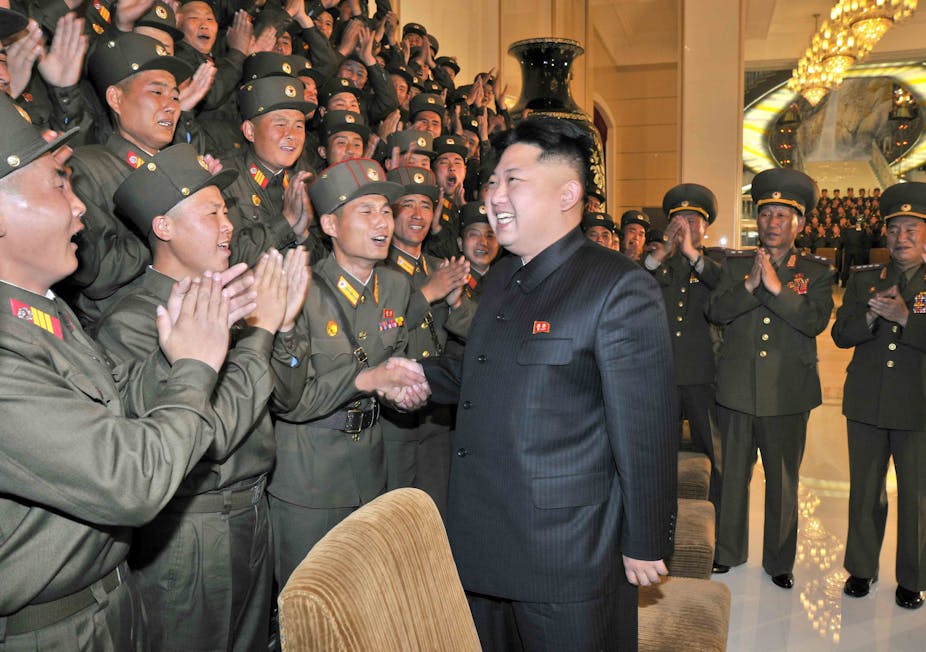The United Nations Human Rights Commission (UNHRC) report into human rights abuses in North Korea, released on Monday by panel chairman Michael Kirby, highlights the impact of the government’s extreme social controls on ordinary North Koreans.
Despite the attention that the UNHRC investigation has received, the report does not reveal much new information about the human rights situation in North Korea. It accuses the regime of six main human rights abuses: arbitrary detention and torture, starvation, denial of freedom of thought, denial of freedom of movement, foreign abductions and discrimination.
Nonetheless, the report is valuable as a systematic and comprehensive catalogue of evidence. Chief among its recommendations are that “the international community must accept its responsibility to protect the people” of North Korea from crimes against humanity.
However, the obvious moral force of this proposition belies the intractable difficulties of undertaking any real action.
Lack of enforcement mechanisms
The fraught strategic environment that has complicated international nuclear non-proliferation efforts in North Korea also makes it difficult to enforce any indictment of the North Korean leadership for crimes against humanity.
Military intervention is a non-starter for obvious reasons. If we consider the potential impact of war in North Korea, with estimated casualties of up to 500,000 people at a cost of more than US$1 trillion, the risk is too high to justify the desired gain.
It is disingenuous to argue for protecting the human rights of North Korean citizens by risking the lives of millions of Koreans on both sides of the demilitarised zone through international military intervention.
A united front among regional states is vital if military options are to achieve their desired goals. Such unity seems a remote possibility in a region characterised by an emerging contest between the United States and China.
It is noteworthy that the Chinese government refused the UNHRC investigators access to witnesses in the Yanbian Korean Autonomous Prefecture adjacent to the North Korean border: an area that is the primary exit route for North Korean defectors. The Chinese government provides support for North Korean border controls by repatriating fleeing North Koreans. China is generally cautious about the international human rights agenda, given its own problems with prominent ethnic minorities.
No other legal mechanisms exist to enforce the indictment of a sitting leader whose country does not recognise the International Criminal Court (ICC). In that context, the report establishes an inventory of Kim regime crimes that could be used as evidence to prosecute high-ranking officials through the ICC, but only in the event that the current government falls.
The Kirby panel’s recommendation that the North Korean leadership be referred to the International Criminal Court should not be seen as an empty threat. But past examples in Iraq and the former Yugoslavia suggest that high-level officials charged with crimes against humanity are generally untouchable until they lose power.
Transformative change in North Korea
The UNHRC report makes clear reference to North Korea as a totalitarian state. During the Kim Il-sung era (1945 to 1994), North Korea was one of the closest approximations of a totalitarian state that the world has seen. Nevertheless, there is a danger in emphasising North Korea’s totalitarian tendencies without proper context.
The North Korean coercive apparatus developed in a fortress-like cocoon, influenced initially by the experience of Japanese colonialism and the brutality of the Korean War. It then matured within the polarising political climate of the Cold War and the North’s intense competition with South Korea and the United States.

Any attempts to improve human rights in North Korea through engagement should try to avoid aggravating this siege mentality. This is the world view in which human rights violations are justified by the government.
We should also consider the significant economic and social forces that have coalesced in North Korean society since the mid-1990s, which have eroded the country’s totalitarian system.
Food distribution is a good example. The impact of government food rationing has been weakened by broadening access to food from outside the state rationing system, either through local markets, home-grown produce or theft from state farms. Grassroots entrepreneurialism has provided some people at the bottom of the class hierarchy with access to foreign currency and with it an increased ability to buy food. This has decreased the leverage of official social controls.
At the same time as grassroots forces are altering the relationship between the North Korean state and its people, the government has embarked on cautious economic reforms. These are opening the country to foreign capital and expertise. The firewall isolating the people from information about the outside world is also more porous than in the past.
So in the absence of a credible “big stick”, fostering evolutionary social change may present another option to improve the human rights situation.
This is not to downplay the pain of those North Koreans who have suffered horrendous abuses, or excuse the perpetrators of these abuses. But it is important to recognise the impact of the burden of history and the transformative influence of emerging social forces as we consider the implications of the UNHRC report.

